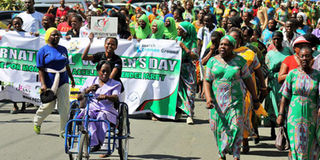Big 4: Game changer for gender parity

Women in Mombasa march along Nkrumah Road on March 8, 2016, celebrating the International Women's Day. PHOTO | WACHIRA MWANGI | NATION MEDIA GROUP
What you need to know:
- Sweden and other development partners are supporting the promotion of an agricultural sector transformation strategy.
- Gender equality requires complementary work by the State and non-state actors, who include NGOs and women’s rights networks.
On this year’s International Women’s Day on Thursday (March 8), we look to the future and the opportunities for advancing gender equality in Kenya.
The third Medium-Term Development Plan towards achieving Kenya’s Vision 2030 is about to commence.
President Uhuru Kenyatta also recently unveiled his ambitious ‘Big Four’ agenda of healthcare, food and nutrition security, manufacturing and housing.
Together with the United Nations Sustainable Development Goals (SDGs), this provides an important platform.
HEALTHCARE
We consider the ‘Big Four’ to be bold not only in terms of achieving higher economic growth and greater equity, but also for the potential to be a major game changer for gender equality.
Take, for example, the commitment to attain universal healthcare.
The opportunity cost of unaffordable and inaccessible healthcare is high.
The Ministry of Health estimates that 16 per cent of the sick do not seek treatment due to financial constraints. The burden often falls on family members, mostly women, who suffer loss of income for the time and money spent.
Universal health coverage can positively affect women’s ability to join and stay in the workforce and safeguard their livelihoods and families’, contributing to the overall economic growth.
WOMEN
This year’s UN theme, ‘Time is now: Rural and urban activists transforming women’s lives’, reminds us of two important aspects that must be at the heart of all development agendas.
The first is that people must be at the centre of any big shift in policy or agenda, which must seek to address the needs arising from the complexities associated with education, geographical location, ethnicity, gender, age and economic class.
In our work supporting Kenya’s national priorities on gender equality and women’s empowerment, we recognise the diversity of women, men, boys and girls.
Just over half of the population is female, which constitutes a huge potential if given the same rights and opportunities as men.
A new booklet, Women and Men in Kenya, produced by the Kenya National Bureau of Statistics (KNBS), in cooperation with the Embassy of Sweden and Statistics Sweden, shows that there are still huge differences in the representation of men and women in the decision-making posts in the private sector.
NATIONAL GROWTH
Women are also under-represented in public administration, with a higher percentage of men at all levels of decision-making.
Furthermore, Kenya is a pathfinder for the ‘Making Every Woman and Girl Count’ gender and statistics flagship with the Bill and Melinda Gates Foundation and UN Women to improve availability of data.
The ‘Big Four’ will need to rely on disaggregated data to, for instance, target those most left behind in wage earning from manufacturing, affordable housing, healthcare and food security — often poor women, men and children.
Sweden and other development partners are supporting the promotion of an agricultural sector transformation strategy, which aims to enhance food security and manufacturing through agro-processing.
PARTNERSHIPS
This will contribute to higher productivity among the smallholders and informal micro-, small- and medium enterprises from which women and youth derive their livelihoods.
The second aspect lies in partnerships. UN Women’s work, in addition to its support to the State, also involves establishing partnerships with rural- and urban-based gender equality activists.
Gender equality requires complementary work by the State and non-state actors, who include NGOs and women’s rights networks.
The SDG 17 requires multi-stakeholder partnerships that share knowledge, expertise, technology and financial resources.
Creating women champions is another way forward. Women are under-represented, even on the Internet.
PROFILE
Wikipedia is the world’s largest online and user-generated encyclopedia and its content influences millions of users’ knowledge about the world.
However, 90 per cent of the content is created by men, and there are four times more articles about men than there are about women globally.
The #WikiGap initiative aims at closing the gender gap online by making sure prominent women are being profiled on Wikipedia.
WikiEditors organise edit-a-thons to add articles on Wikipedia about women experts and role models from Kenya.
By doing so, they highlight female role models to inspire new generations of women to take their space in society.
The ‘Big Four’ could also gain from highlighting women’s achievements.
Sustainable democracy and poverty reduction can only be achieved if the entire population is guaranteed and enjoys equal rights.
Ms Jardfelt is Sweden’s Ambassador to Kenya and Ms Kavuma is the Country Director of UN Women, Kenya





